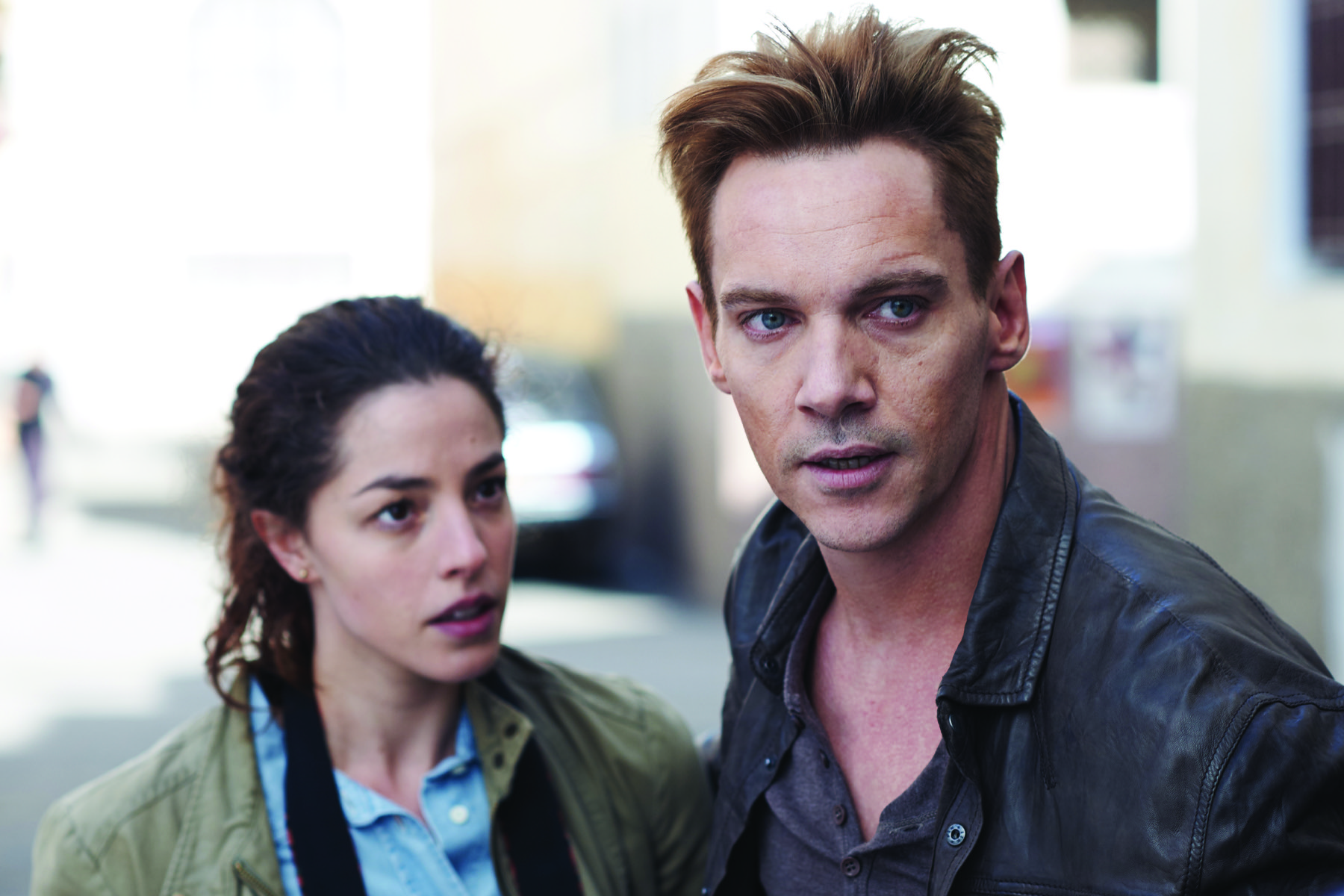 Photo courtesy of Vertical Entertainment
Photo courtesy of Vertical Entertainment The journey from page to screen can be long and arduous, as demonstrated by the new film “Damascus Cover.” Thirty-one years after novelist Howard Kaplan’s Middle East spy novel of the same title climbed best-seller lists, the film adaptation by director Daniel Zelik Berk is now opening in theaters and will soon be available online.
The movie stars Jonathan Rhys Meyers as Mossad operative Ari Ben-Sion, and the late John Hurt gives his final screen performance as Ben-Sion’s boss at the Israeli agency.
Berk, a former lawyer who worked in film acquisition, distribution and development before he became a producer, had been searching for a story to adapt and direct. Having also worked as a cultural affairs envoy for the Israeli Consulate, he wanted to make a film about Israel and read the novel at a friend’s suggestion. He spent almost a decade getting the story made into a movie, overcoming financing, logistic and budgetary obstacles. But first he had to write the script.
In the novel, set in the 1970s, Ben-Sion is tasked with smuggling Jewish children out of Syria. His mission in the movie, set in late 1989 amid the fall of the Berlin Wall, is to rescue a chemical weapons scientist from Syria — “A time of change when there was hope,” Berk told the Journal.
The movie involves Israeli and Syrian spies, ex-Nazis, an American photographer (Olivia Thirlby) and a mysterious figure known as The Angel.
“There’s twists and turns, and you’re trying to guess who The Angel is,” Berk said. “When you find out, it makes sense. It’s a nice twist and it’s satisfying.”
Shot in Morocco with a few second-unit days in Berlin and Israel for establishing sequences, the film includes several Israeli actors, including Igal Naor (“False Flag”), Tsahi Halevi (“Fauda”) and Neta Riskin (“Shelter”).
To immerse himself in the lead role, Rhys Meyers got tips from a former Mossad operative who served as an on-set adviser and instructor in spycraft and the Israel Defense Forces’ system of self-defense and fighting called Krav Maga. And for an emotional understanding of the Middle East conflict and his character, Rhys Meyers drew upon the complicated, violent history of conflict between the Irish and the British, which he was exposed to while growing up in Dublin, Ireland.
“It’s not the same situation as the Middle East but I understood the tension, living day-to-day in that kind of environment,” Rhys Meyers said. “It’s a vicious circle, because the children grow up in conflict zones and don’t know any other way to be. It’s an atmosphere of fear and paranoia, and the ones who suffer for it are the children.”
“There’s twists and turns, and you’re trying to guess who The Angel is. When you find out, it makes sense. It’s a nice twist and it’s satisfying.” — Daniel Zelik Berk
Rhys Meyers said he was attracted to the script because “it had all the elements of an old-school spy story, not the high-tech spy stories we have now. No cellphones. And there are no gaps in the script where you have to spend $50 million to keep people entertained.”
The Ben-Sion character intrigued him as well.
“He’s incredibly complex because of the things that have happened to him,” Rhys Meyers said. “He recently lost a child. He also screwed up his last mission. He’s not in a good place, which makes him perfect as a patsy. He doesn’t know until close to the end of the film that he’s being used to root out a bad egg.”
Known for his roles in the TV shows “The Tudors,” “Elvis,” “Roots” and “Vikings,” and the movies “Match Point” and “The Tenth Man,” Rhys Meyers said he considered “Damascus Cover” a career highlight.
He also has three other films due in theaters in the coming year: “The Aspern Papers” — which he called a “dark and unsettling story” — is based on a Henry James novel and set in Venice, Italy, with co-stars Vanessa Redgrave and Joely Richardson; “Wake Up,” about a cop who awakens from an accident accused of a murder he didn’t commit; and “Holy Lands,” a family drama set in New York and in Israel, where his character’s father (James Caan) moves to become a pig farmer — Rhys Meyers’ second Israeli-themed film shot outside of Israel.
While Rhys Meyers has never been to Israel, Berk, a committed Zionist, has visited many times. Raised Conservative in Pittsburgh, Pa., and La Jolla, Calif., Berk said he participated in the March of the Living trip to Europe and Israel while in college, which “ignited my Judaism. I came back from that trip really changed.” The trip also prompted him to transfer to Brandeis University for “a more Jewish experience.”
Berk and his wife, Blair, a lawyer, are members of the IKAR congregation and celebrated their daughter Blythe’s bat mitzvah in Jerusalem four years ago.
Berk said he hopes to make a film someday in Israel, where he recently held a screening for the cast and crew of “Damascus Cover.” The film will debut there on Netflix in October.
“Damascus Cover” opens in theaters on July 20. It will be available on iTunes and on-demand July 27, and on Hulu after its theatrical run.






















 More news and opinions than at a Shabbat dinner, right in your inbox.
More news and opinions than at a Shabbat dinner, right in your inbox.